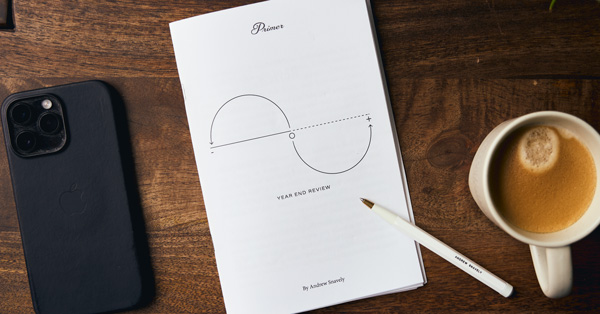This is the final part in our series on combating phone phobia.
➳ Part 1: Why It’s Time to Stop Being an Email Person and Start Being a Phone Person
➳ Part 2: Introversion is No Excuse for Awkward Phone Calls
Mike Brooks never wanted to be a salesman. In fact, he hated it. He hated picking up the phone. He hated the cold calls. He hated the rejection. But selling investment securities over the phone was his job. And he needed money to pay the rent.
Unfortunately, Mike worked on commission. If you don’t make a sale, you don’t get paid. And that’s what happened to him for a straight month. For a month, his life was an endless string of painful cold calls and even more painful rejections. He decided to quit. All he needed was one sale and he could pay the rent, fill his car with gas and get the hell out of there. His exit strategy became his driving hope, and finally, he got a prospect lined up: a slam dunk sale that would earn him $1,000. Quitting money.
Then, the worst happened. Mike called up the prospect to close the deal and, for whatever reason, they said they were going to pass.
That smacking sound was Mike’s window of opportunity slamming shut.
Mike was crushed. He hung up the phone and walked out of the office. It was 1PM in the middle of May, and he wandered like a zombie through the Southern California heat. His plan to make a graceful exit was ruined. His backup plan was to make a shameful exit instead, even though he couldn’t afford to.
Sweaty and discouraged, he dragged himself past the Porsches and Mercedes owned by the top closers on his way back to the building, He thought about those top three closers, the ones who always marched past his desk with their broad smiles after the monthly bonus lunches, clutching their big checks.
“What are they doing differently that I’m not?” Mike thought. “They don’t have wings.”
These top three closers weren’t smarter or better than him. So, why were they on top?
“I decided at that moment that if I quit now, when the going gets tough, I’ll always quit.” This is Mike telling me the story, decades later, on the phone. “I made up my mind on that day that if I was going to quit, I was going to quit on the top, not on the bottom.”
He committed to closing the gap between him and those smug top closers. He did everything it took.
He bought sales CDs, he read books. He recorded himself on the phone and pored over the tapes, like a football coach watching game footage. He even recorded others, sticking his tape recorder over the cube wall to capture the sound of the successful salesmen doing better than him. He relentlessly critiqued himself, consciously focusing on getting better on each and every call. He set an intention to go from being the worst to being the best, and in 60 days, he did it. Two months after that low moment where he was about to walk out in shame, he was one of those top three closers collecting a fat check during the bonus lunches. 30 days after that, he was number 1 in the office. He was the best.
I’m telling you this story because it illustrates something that I need to be true. I need it to be true that, even if you are a grown ass man deep into your career, even if you have been bad at something for your entire life, even if you hate doing something, you can get better at it. Not only that, you can master it. Mike’s story proves that this is true.
Mike Brooks started out as the worst salesman in his firm, just waiting for his opportunity to quit. Now, he’s a recognized authority on inside sales, and he makes his living teaching other people how to repeat his success.
Millennials: Pick Up the Phone!
Like Mike, no one ever taught me how to talk on the phone. And like Mike, I’ve come to the realization that I simply cannot exist any longer without mastering this skill, both in my personal and professional lives.
As I discussed in part one of this series, many of us Millennials have a self-imposed disadvantage when it comes to the phone. We like email and text instead. It’s what we were raised on, and it’s our comfort zone. If there’s something that can be done, it can probably be done better through an app or over the internet, or so we believe. But the fact of the matter is that the rest of the world doesn’t feel that way.
We Millennials are going to be called upon to be the best versions of ourselves on the phone. For me, this is a stretch. Still, I’ve decided to embrace the challenge. And as Alexa Fischer explained to me in part two, there is nothing about my personality that should prevent me from conquering this challenge.
I’ve been talking to strangers on the phone. I’ve been dialing random numbers. I’ve been cold calling and I’ve been scheduling interviews. I’m not selling anything, but like Mike Brooks, I’m after one thing: I am consciously focusing on getting better on each and every call.
After my first few months of doing this, I’ve come up with a few guidelines that I think will help my fellow Millennials be better on the phone. If you hate the phone and avoid it like the plague, then these tips will help you feel more confident the next time you are forced to dial. If you think you are perfectly fine on the phone, then read on anyway. There is always room for improvement, and if you can pare away some of the distractions and deepen the personal connections you make on the phone even a little bit, then it will all be worth it.
A note before we get into these tips: Some of these are going to sound very basic and obvious. There’s a reason for this. Most of us aren’t bad on the phone because we don’t know how a phone call should sound. Rather, most of us are awkward or anxious on the phone because of the subconscious habits we’ve picked up. These tips are meant to restore intentionality to the way you speak and listen on the phone. So, even if the tip seems like something you already knew, I encourage you to apply it anyway. I’ve included little challenges at the end of each tip to help you do that.
10 Essential Tips for Having Better Conversations on the Phone
1. Choose the Phone
For most day-to-day tasks, you have two choices for getting it done: online or by phone. As digital natives, we often choose to go electronic whenever we can. Change that. Whether you are scheduling a vet appointment for your dog or asking a friend a quick question, you should choose to use the phone whenever it is an available option. You should especially do it for these tiny, mundane tasks.
Why?
It’ll acclimate you to using the phone in situations where you are guaranteed success. If you save the phone for all the huge, daunting tasks, like job interviews, calling distant relatives, or breakups, then you’ll infuse the phone with all the anxiety, discomfort, and pressure associated with those things.
If you don’t have a good reason to make a phone call, then invent one. Call the Dunkin Donuts customer service line and ask them when they are going to get rid of styrofoam cups. Call the number on a piece of junk mail and ask to be removed from their mailing list. Call up the number in the byline of a news article and tell the journalist that you enjoyed her piece.
The beauty of talking to businesses and customer service reps for huge corporations is that they are required to be nice to you. It’s their job, and their bosses are probably recording them for quality assurance. You can be at your most awkward and incoherent, and the person on the other line will still have to say: “I really appreciate your call, today, sir. Let me see what I can do to help you with your question.”
I know, it doesn’t seem like much of a victory to be able to successfully call an 800 number with a random question. But if you are like me and harbor a bit of phone anxiety, then it’s the best thing you can do. When you pick up the phone, talk to someone, and then hang up without feeling like an awkward idiot, you are slowly reconditioning your subconscious aversion to the phone.
This is an important step, and it’s something you have to do before you implement any of the conscious tips that follow.
Challenge
Invent reasons to place two or three low stakes customer service phone calls in a week. Instead of emailing or filling out a customer feedback form, call the 800 number or the direct line for your local store. Complain, compliment, or inquire about something you care about.
An aside
Exposure Therapy: Retraining Your Amygdala
Fears and phobias stem from your amygdala sending you false positives about lurking danger. The amygdala works associatively, not logically. It’s always passively watching in the background, but it gets activated when you are afraid. When you are in a fear state, the amygdala starts remembering all the things around you. So, if you have an embarrassing experience on the phone, then the amygdala makes that association: phone = shame and humiliation.
The amygdala learns by conditioning, which means you can’t talk yourself out of being afraid. Once you develop a fear, your amygdala will send fight or flight signals when the associative condition is encountered. For instance, if the phone rings, your heart races, and you avoid picking up the phone and feel better, your amygdala reinforces that response. Basically, it goes: “Hey, I made us run away and we didn’t die. Mission accomplished.”
If you keep running from your fears, you’ll keep reinforcing your amygdala’s association of that condition with danger, and you’ll keep getting the fight or flight signals. The only way to change this is to recondition your amygdala. When you encounter the fear trigger, you have to stick around. You have to fight the fear until it dissipates. Then, your amygdala will get it. It’ll be like: “Oh, I guess I was wrong about this thing being a sign of danger. I’ll go ahead and change that association.”
That’s what exposure therapy does. It tells your amygdala that it’s fear association is wrong. If you don’t do this, you’ll never stop being afraid.
You have to prove to your subconscious what your conscious brain already knows.
2. Be Scripted
There’s one piece of advice that Dana Manciagli, Alexa Fischer, and Mike Brooks all gave me: script your calls.
This goes against my instincts. It would seem incredibly weird if someone were to walk into your office and start reading off a sheet of paper. The beauty of talking on the phone is that no one can see what weird shit you’re doing on the other end. But in all seriousness, having some notes or even word-for-word scripts written out is not all that weird.
When you write an email, there is a drafting and revising process involved. You type out what you want to say, you go back and read it, then you pare it down or adjust your language to sound more professional and more to the point. You might even let it marinate for a few hours before hitting send. That’s completely normal.
Why shouldn’t we do the same thing when we place calls?
“I worry that I’m going to sound scripted,” I tell Dana Manciagli during our interview. I’m worried about sounding fake or unnatural.
“What a wonderful problem that would be!” Dana says.
Most of the time, we sound so far the opposite that sounding a little scripted is an excellent goal. Rather than stuttering, rambling, hesitating, misspeaking, and um-ing, and ah-ing our way through a phone call, we would sound far better off if we sounded a little bit too polished.
“Don’t worry about sounding scripted. Because most of us do not,” says Dana.
Of course, you don’t have to get extremely detailed. You don’t have to painstakingly write out your response for every single way the conversation might fork. But by sitting down and planning what you want to say and what you expect the likely response to be, you’ll develop a more detailed picture of what it is that you want to say and how you feel about the topic.
For me, I usually write out a few bullets and have them in front of me when I talk. This helps me structure the call a bit and prevents me from ending it before I’ve said or asked everything I need to.
As Dwight D. Eisenhower is oft-quoted: In preparing for battle I have always found that plans are useless, but planning is indispensable.
Challenge
The next time you have a big phone call coming up—a phone screening, a sales pitch, an interview—write yourself a script. You don’t necessarily have to use it. But make sure you actually write it down on paper.
3. Call from the Right Place at the Right Time
This is one of the worst parts of calling versus emailing. You can email from anywhere at anytime. You can send your boss an email in your pajamas from the toilet. But on the phone, you’ll have to be dressed and it’ll have to happen between 9 and 5.
If your call is at 2:30PM, be ready for the call at 2:00PM. What does this mean? It means you’ve confirmed the time of the call, the correct time zone, and the phone number of the person you are calling. You have your script written out and all your materials in front of you. Your battery is charged and you’re sitting or standing somewhere quiet that has good cellular signal. You have all these things in place, and it is 30 minutes before the scheduled time for your call.
Do not schedule back-to-back calls and show up five minutes late to the next call. Being fashionably late won’t score you points.
Do not call from a noisy coffee shop or an airport. If you can’t find a good quiet place to call, try a hotel lobby or, worst case scenario, your parked car. If it’s hot out, get that car cooled down in advance and then turn off the blowers during your call.
Turn off the TV in the background. Put your dog outside. Cover your parakeet cage.
There are a million excuses to be late or unprepared for a phone call. But at the end of the day, it all comes off as poor planning and preparation. Yes, it’s hard to find a quiet place to call in the middle of your workday. Yes, sometimes web conference calls make you download a little applet before you can sign on. Yes, cell phone batteries die, headsets go wonky, babysitters cancel, traffic gets bad, etc. None of that matters. Being on time for a phone call is a pass/fail test. Do what it takes to ace it.
Challenge
Scout out a good place to make phone calls during the week. If you are holding down a 9 to 5 job while looking for another one, figure out what time and what day works best for you during the week.
Bonus tip: If you are interviewing or working from home, make sure you are prepared in case the phone call escalates to a video conference. This is an especially clear and present danger if you are using something like GoToMeeting or Skype already. Comb your hair, wear a nice a shirt, and take down the Andrew WK poster behind you, just in case.
4. Get Comfortable
Each call has a beginning, middle, and an end. Make sure you don’t talk about anything substantive before the beginning.
When is the beginning of the call? It’s not when the other person picks up the phone and says “Hello?” It’s once you’ve identified yourself and confirmed that it’s an okay time to talk.
Even if your call is incredibly urgent, the first thing you should do when you call someone is to ease into the conversation mode. As Alexa Fischer explained to me, it might feel like it takes a long time, but truly, it will waste more time if you blast someone with information or requests and they have to stop you halfway through to tell you that now’s not a good time.
I’m guilty of that. So, what I’ve been doing is consciously focusing on one and only one goal when I first get someone on the phone: to ease into that conversation mode.
The reality of the phone is that it’s always going to be a little awkward. It doesn’t matter how comfortable either of you are on the phone or with each other, getting a phone call started involves a bit of orientational overhead. If you want to have a productive call, you have to diffuse that awkwardness—whether it stems from temporal, technological, or personal causes—before you begin.
I set an intention to let this “getting settled” period last as long as it has to, and I wait until the person on the other line signals to me that they are ready to get started. I resolve to let this period last five minutes or more, if it has to, but really, it has never taken more than 30 seconds. (Time passing in awkwardness can feel longer than it is, but watching your call timer will give you a reality check.)
You are always better off waiting 20 seconds on hold or calling back in 3 minutes when the other person can give you their full attention. Do this even if they should be expecting your call—who knows how their day is going? People don’t usually want to be rude by telling you that they aren’t ready yet unless you specifically ask them. Unless you ask, they might never offer up that hey, I know we had this on the schedule for 8AM, but a few seconds ago a bulldog just bit my arm off and maybe can I call you back after I get a bandaid?
Make sure you confirm that the person is ready to talk and can hear you okay before you begin.
Challenge
If you are a rusher, set a goal the next time you are on the phone to wait at least 30 seconds before you get to your point. Fill the space with chitchat or anything else.
5. Shut the Hell Up
There is a rhythm to phone calls, one that includes purposeful pauses and silences. Do not mistake these for awkward silences or dead space. They are an essential part of the conversation. Your phone call should not sound like a game of charades, with one person rapidly shouting out phrases and keywords at random, hoping one will be on the nose.
Dana Manciagli has a good rule for this. She calls it The Law of Threes: Say no more than three things and then stop talking. Just shut up. That’s it. That’s the whole law.
If you are following your script, you’ll have given your strongest points by now. By shutting yourself up, you’ll prevent yourself from rambling. Rambling leads to going off script, venturing into uncharted territory. Each thing you say after you say your best three things will be less powerful and less coherent than the thing before it.
“Learn how to pause,” Dana tells me. “Take a breath. If the caller wants more, he or she will ask. Learn to be confident in your silences. People appreciate the pause.”
Let enough time to pass for the person to write and think about what you just said, and if you need to, simply ask, “Would you like me to elaborate on any of that?”
How long should that pause be? Mike Brooks, who also believes in the virtues of shutting up on the phone, demonstrated the pause to me during our phone call.
He stops talking, waits a few moments, and then asks me: “How long do you think that was?”
I don’t know. It felt like a long time. Even with him telling me he was about to stop talking, I started to feel anxious as the silence bloomed on the line.
“That was 3 seconds,” he tells me.
Silences feel a lot longer than they actually are on the phone. In those 3 seconds, I felt the urge to jump in and start talking. But 3 seconds is hardly enough time for someone to process something I’ve said, or think about the next thing they are going to say.
This is why Mike tells me to start using the mute button on my phone. When you hit the mute button, you prevent yourself from interrupting and you force yourself to listen. On the phone, interrupting isn’t limited to talking when someone else is talking. It also includes talking during those meager 3 seconds when the other person is processing the conversation.
What should you say after 3 seconds has elapsed? If you want to hear more from the person, simply unmute yourself, say “Oh?” and hit the mute button again. This will prompt them to keep talking.
Mike explains that this is something that police investigators do. It’s not about interrogating and asking questions over and over. “Police investigators say: When a suspect starts talking, it’s simple. We avoid doing anything that will stop them from talking.”
Challenge
Use the 3 second pause. Watch your call timer and force yourself to wait 3 seconds from the moment when you think the other person has stopped talking before you start talking. You’ll be surprised at how much more they might have to say. When you are the one talking, use Dana’s Law of Threes. Speak your piece, and then stop talking. Make a strong point, and then own the silence. If you’ve done that, then the silence is only awkward for the other person. They will be the ones feeling the urge to say the next thing. Wait for them to say it.
6. Listen No Matter What
Listening on the phone can be hard to do for several reasons. The first one is the urge to ramble, and hopefully, you’re controlling that urge with the Law of Threes and Mike’s 3 second rule. The second one is the need for preparation. You need to be distraction-free and ready to give your full attention to the phone.
Technical difficulties are the third challenge. Poor signal, bad call quality, and dropped calls are realities of doing business on the phone. Acknowledge them and work through them. If you didn’t understand what someone said, don’t guess or gloss over it. Stop and ask them to clarify. If you didn’t hear the whole question, or if you didn’t understand the question, it benefits you to ask them to elaborate or repeat themselves.
Another thing I’ve learned to do periodically in a call is to recap a bit. This keeps you on script, but also confirms that you have a common understanding of what you’ve discussed so far. I’ve also found that it segues into one of the best questions you can ask in a phone call: “Did we miss anything?”
Oftentimes, there are very important points to make that don’t come up organically in a conversation. By raising that question, you prompt the other person to speak up about that thing that’s been lurking in the back of their mind the whole time.
Challenge
Set an intention to never just smile and nod again. Rather than glossing over parts of the conversation that were hard to understand (for whatever reason), slow down during those parts and try to gain clarity.
7. Give Context, Get Sidetracked
We often choose text or email to avoid the time-wasting chitchat and niceties. But this spontaneous superfluous stuff can be the most valuable thing you can get out of a conversation. It’s reasonable to ask a binary question over text and get a one word response and move on with your life. But when you get someone on the phone, the obvious question always pops up: “Why do you ask?”
This can be important.
Getting the right answer to the wrong question can lead to wasted time, missed opportunities, or outright disaster. When you adorn a conversation with all the “extra” chitchat, you put your question into enough context for the other person to tease out the right question from you whenever you are on the wrong track.
Context helps when you are on the right track, too. When someone understands the bigger picture of what you are after, it also helps them help you. Let’s say you ask your friend for the number of the guy who power washed his deck. He can give you the number, but if you keep talking, you can reveal to him that you are trying to spruce up your deck to sell your house. And then he can remember that he was chitchatting someone else, and actually, they are looking to buy a house in your area.
When you take the time to have conversations, you cast a wider net that will often harvest unexpected opportunities.
Challenge
The next time you ask someone a question on the phone, give them a little back story. Explain what you are after and why you came to them with that question. Oftentimes, they’ll be able to help you with the next step of your journey, and perhaps several more down the road.
8. Have a Canned Conclusion to Your Call
This is similar to scripting, but it’s specific to the end of the call. Before you get into a call, have a plan for how you want the beginning, middle, and end to go. Once you get into an organic conversation, you don’t have to follow it exactly, but by thinking about the arc of the conversation beforehand, you can default to your exit strategy if things drag out or hit a lull. Most of all, thinking through how you expect the conversation will go will help you be prepared, and therefore more confident.
This will prevent rambling on either your part or their part and it will help you end on a strong note. While a half hour goodbye might be sweet and endearing to your southern Georgian grandma, it doesn’t make sense for most phone calls. Once you’ve gotten to a good place in your call, deploy your sign off:
“Well, Mr. Smith, thank you so much for your time and I really appreciate the information you’ve given me. I’ll put this together and email it to you on Tuesday for your review.”
Challenge
Develop a strategy for getting off the phone, both for scripted and unscripted calls. Pay attention to the way you end a call the next time you are on the phone and ask yourself if it sounds effective, definitive, and intentional. If not, make it so.
9. Always Be Prepared to Leave a Voicemail
Here’s a quick one: Don’t be caught off guard if the person you are calling doesn’t picked up and you get kicked to their voicemail box. The script you’ve prepared for your call should be easily adapted for a succinct, effective voicemail. Even if you have a scheduled call, you should have a voicemail version of your script prepared.
Challenge
Alexa Fischer has a great video on leaving a voicemail. Watch that. For more tips, check out this PDF resource that Dana Manciagli made specifically for Primer readers that includes exactly what you should have in your voicemail message.
10. Start Good, Get Better
This is not the last article on phone skills you should read. It certainly won’t be the last one I’ll write. If you were just looking for a few tips in order to gain more confidence on the phone, then reading this article was a good start. But if what you want out of life depends on you being incredibly effective and charismatic on the phone, then you have to keep working on it.
The good news is that you can master it. Even if you are worse than a beginner (that is, you’ve picked up some really bad habits over the years), you can become the best version of yourself on the phone. It has nothing to do with your personality or natural born talent. It has everything to do with identifying phone skills as something you want to master and then setting an intention to improve yourself.
How hard will you have to work? That depends on how good you want to get.
If you want to be the best, then you’ll have to be relentless in critiquing and improving yourself. The best thing you can do: record yourself. This is how football teams get better, and this is how Mike Brooks teaches sales teams to get better. “Every football team has hours of game footage and they watch and analyze and identify what went wrong and what went right,” he tells me. “You never have a team go out there and just ‘play really hard.’ You don't go out there and just scramble around. You run football plays. You strategically choose which plays to run and you execute them appropriately. You see how your strategy works and how the other teams respond.”
Record yourself. If this sounds painful to you, then it’s exactly what you need. Why can’t you stand listening to yourself on the phone? What needs to be changed?
As Mike explains, you have to train on the right skills. Practice doesn’t make perfect. Practice makes permanent. If you practice a crappy golf swing off the course, then when you get to the tee, you’ll be able to suck without even thinking about it. You’ll automatically exercise those bad habits.
Challenge
Record yourself talking on the phone. And then listen to it. How do you sound? Is it what you expected? Are you rushing? Do you sound confident? Do you sound professional? If you are serious about improving your phone skills, you’ll do this challenge, and you’ll immediately identify the areas you need to work on. (Make sure you only record your side. The legality of recording both sides of a phone conversation vary widely by state.)
Conclusion and Further Reading
That’s all I’ve got for now. Over the course of this article series, I’ve interviewed a number of experts, three of which I quoted in this piece. I dialed my phone over a hundred times and spoke to over 50 people (and got countless voicemail boxes and no-pickups). What you’ve just read are the condensed lessons I’ve learned during that experience.
I feel like I have shed some light into the void. But I still feel like I’m barely scratching the surface.
The three experts who contributed to this series are working everyday to help people like me get better on the phone, on screen, or in-person. You should really check out all they have to offer.
Dana Manciagli wrote the book Cut the Crap, Get a Job! A New Job Search Process for a New Era, which you can get on Amazon. There’s a Kindle and Audible edition, too. For you Primer readers, though, she’s adapted the chapter on phone skills and is letting us read it for free. Check it out here.
Alexa Fischer has a crazy popular video course on Udemy called How to Create a 1000 Watt Presence. I’ve been taking the course and I can already feel it changing my life.
Mike Brooks, aka Mr. Inside Sales, has a script for practically every sales scenario that will ever occur on the phone. If you’ve just read this article because you have a team of Millennials who need to stop sucking on the phone, he’ll come to your office and whip your team into shape, too.
If you haven't read Part 1 and 2 of this series you can check them out here:
➳ Part 1: Why It’s Time to Stop Being an Email Person and Start Being a Phone Person
➳ Part 2: Introversion is No Excuse for Awkward Phone Calls



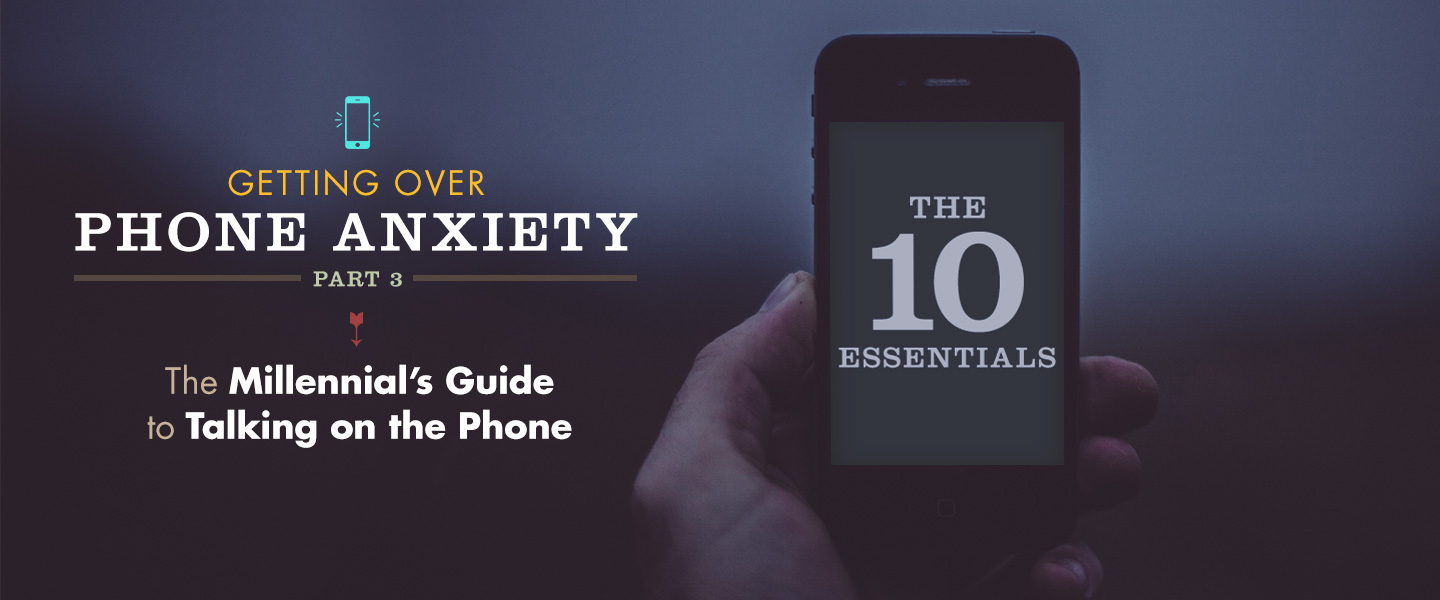
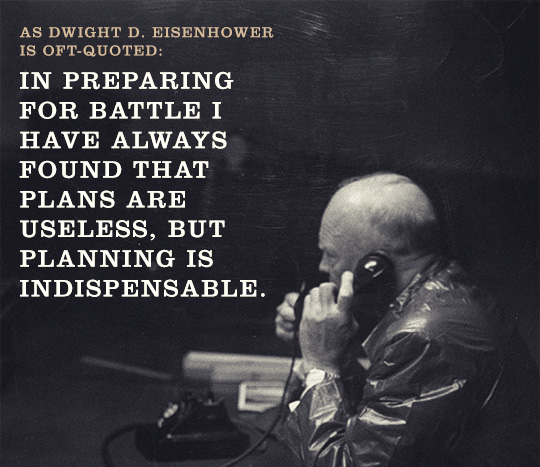
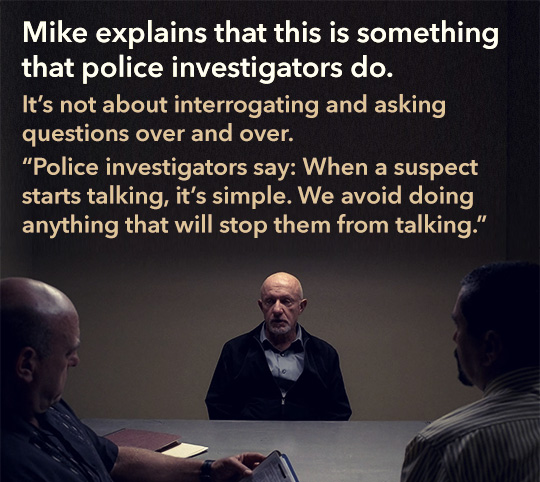






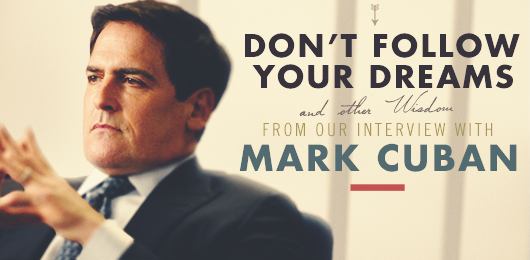

![It’s Time to Begin Again: 3 Uncomfortable Frameworks That Will Make Your New Year More Meaningful [Audio Essay + Article]](https://www.primermagazine.com/wp-content/uploads/2025/01/begin_again_feature.jpg)

